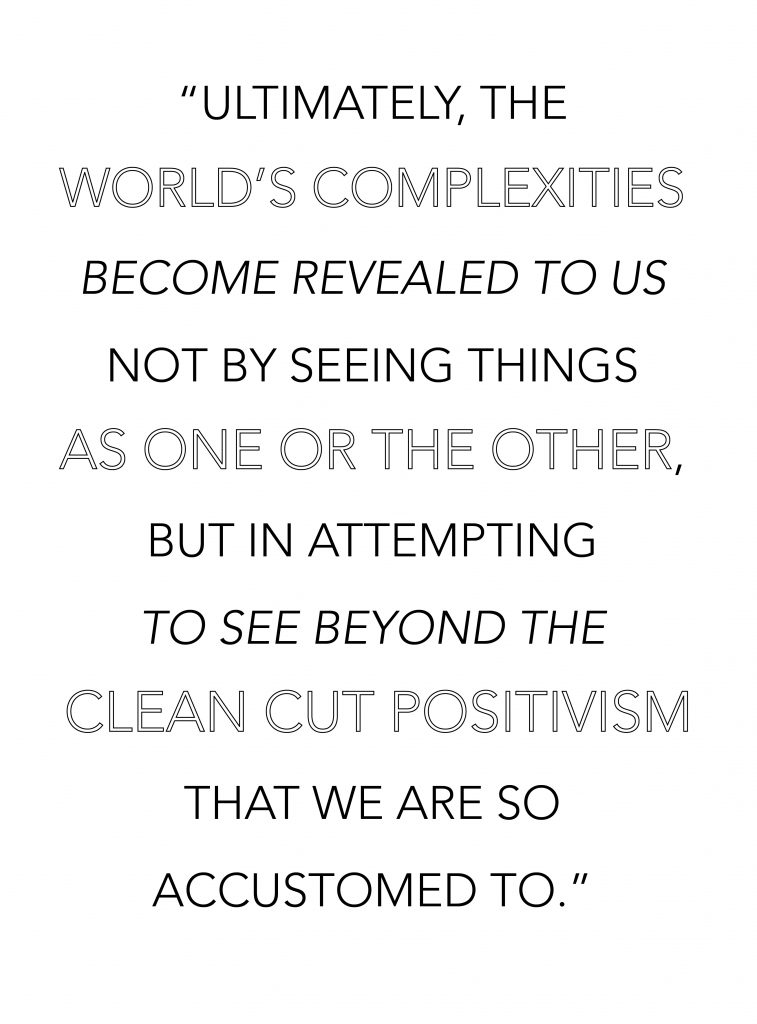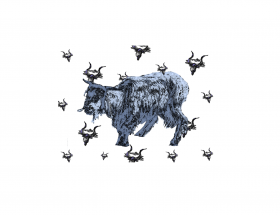Britney Spears shares a bit of wisdom at the beginning of her song “Circus” with her listening audience- there are two kinds of people, those who entertain and those who observe the ones who do.
Ontological dualism, much like Britney Spears has spent my entire life telling me, is the belief that everything can be evenly and easily split into two categories. There’s a way of doing things correctly, and there is also a way to approach them incorrectly. Certain things fit into the category of “good”; others fit into “bad”.
Most of the ethical/philosophical education I have received in the most recent years of my life has been dedicated to finding the nuance and spectrum between the two, but as my own way of thinking about the world changes, so does the way I basically define “good” and “bad.” Additionally, this same moral dualism has got me in the habit of categorizing things under two labels, even when it does not make sense to do so. These two labels (no matter how nonsensical) to me always seemed real, solid, well defined, yet ultimately- limiting.
In politics, I had always been told that things were defined by a spectrum between left and right, and morality as well on a spectrum of grey between black and white. These very real, well defined, totally not socially crafted ends stuffed reality between the two dots on a spectrum and claimed that a variety of truths existed, but only existed in relation to these two extremes. Everything has a label and is defined by what it is not arguably more than about what it fundamentally is.
It was not until I came across Michel Foucault that I ever thought about why these limits might be erroneous in the least. How can we really think “outside the box” and grow as a society if we do not think outside of the limits we place on our ways of knowing? If everything exists on a spectrum, knowledge can hardly be growing and innovative but rather exists as a reiteration of the establishment of dichotomies that in turn create paradigms that hardly attempt to capture the complexities of the world around us.
The creation of these dichotomies, more than anything, is done with the purpose of creating the illusion of a supposed “all encompassing truth,” a highly powerful tool that dictates the way that people see society, one another, and above all else- themselves. Foucault, in his work, shows himself critical of the amount of control that can be exerted on individuals through this so called regime of truth, something which dichotomies form a large part of. The Cartesian approach, for example, fits into the Enlightenment paradigm (that arguably continues to exist today) and claims there to be dualism between the rational mind and the irrational body. The first thing to notice in this case is the blatant prioritizing of rationality and reason as ways of knowing, which in turn has largely undermined most others in the name of “progress.” This has mainly proved ineffective in allowing a holistic understanding of the fundamental nature and actions of people, especially coming from a myriad of cultural backgrounds. In turn, this form of reasoning has largely been used to back colonial paradigms that seek to support the concept of Western superiority and hegemony. Avid adherence to these has, as a result, constructed a highly unequal world that follows the power structures that have kept the Global North wealthy and the Global South submissive for centuries, and more importantly, keeping everyone accepting this status quo as something “normal.”
This (largely) Western approach to knowing and knowledge appears to give an all encompassing solution to the world’s problems even while these have fundamentally failed in a multitude of aspects, and raises a second problem- that of inclusion. Most of the dichotomous Enlightenment thought we follow in mainstream academia (that mainly comes from the Global North), exemplified in Descartes’ mind body problem is the creation of an “outside” and an “inside.” Though during its 17th century context this managed to demythologize the Christian orthodox conception of the body and allowed the study of anatomy to advance, its implications for the comprehensive study of mental health were not exactly at their prime. This oversimplified separation between the two has led to non-comprehensive attitudes towards the significance of the mental health of varying individuals. Instead of comprehending the experience and make up of humans as interrelated, overtime, this approach has mislaid its subject matter and to an extent given up a sense of “moral responsibility toward the real health concerns of human beings.”
The problem of inclusion goes beyond these concerns of mental health, but also further in the organizational methodology of Descartes, that is based on the concept of excluding one thing in defining another. Organizational limits, for example, have been the basis of a myriad of institutions that surround us today, many of which have proven to be somewhat barbaric as society changes (i.e. prisons, madhouses). A key idea Foucault debates in the work of Descartes comes from the exclusion of the concept of madness in defining sanity or more specifically, reason. The idea of isolating those with mental illnesses by incarcerating them in places of confinement, for instance creates the concept of the “other” to those who are considered to not stray from the norm, and legitimizes certain false dichotomies that allows rejecting the people who do.
The foundational thought of the Enlightenment came from philosophers that (in great part) formed part of a new world that had dealt with the horror and destruction of the Thirty Years War and was moreover scared to construct a society that included this scary concept of an “other.” The Treaty of Westphalia was drafted and the concept of the modern day nation state was born, specifically made to avoid issues and wars of this scale from happening again. This of course brought about nationalism as we know it, built on the idea of unity based on a shared identity between citizens. This was meant to be encapsulated in the essence of the nation, calling for blind loyalty and granting full authority to the state to act under the interests created for the nation itself.
Looking back on history now, nationalism has bred senseless wars, totalitarian dictatorships, and brutal colonial/imperialist expansion, but thinkers of the time were unaware of its imminent danger in years to come while elaborating their philosophical framework. Though maybe not fully consciously, the framework of exclusion of the other and the rejection of difference is worked into the philosophical musings of Western European thinkers of the time. As we continue to function in the framework of the Enlightenment, we perpetrate a dichotomous mindset that is not only irrelevant but in many ways harmful as well. The incomprehensible outside remains a terror to people around the globe today, but as the world becomes increasingly globalized and the way in which we define dichotomies changes at a much higher frequency than they ever did before, it becomes clear how much expanding our limitations is essential now more than ever.
Considering a myriad of possibilities and realities outside the ones that I have always known, pushing limits and changing the automatic setting that my brain has of categorizing things after superficially perceiving them is something that comes with realizing that the epistemic and ontological background most of my knowledge is based on are rather limited. Realizing these limits, and that the dichotomies that dictate my life largely remain pertinent to a socio-historical context relevant to 17th century Europe means attempting to see knowledge as an ever-changing mass of content instead of as a spectrum. Ultimately, the world’s complexities become revealed to us not by seeing things as one or the other, but in attempting to see beyond the clean cut positivism that we are so accustomed to. Expanding our horizons as individuals to see the world as an ever-changing entity where no one shares universal experiences but rather weaves them together as a sort of tapestry that is ever moving may just be the way to grow in ways unprecedented as individuals, and ultimately as a society.
photography by Isabella Baxter






